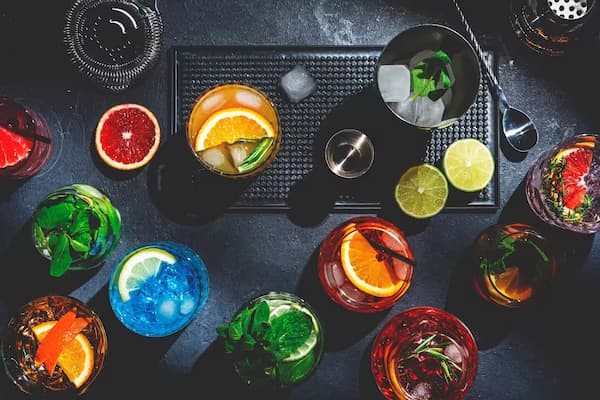Tonic water
With Tonic water you can make
A global sip with Mexican flair.
Salmoncito
Gin, Campari, Grapefruit Juice, Tonic water
Fruity mojito with a gin twist
Strawberry gin mojito
Gin, Lemon Juice, Sugar / simple Syrup, Tonic water, Mint Leaves, Strawberry
Bubble up with vibrant citrus vibes!
Citrus Fizz
Lime juice, Orange juice, Angostura Bitters, Tonic water
Herbal sweetness with a fizzy twist.
Pear-Rosemary Twist
Vodka, Sugar / simple Syrup, Tonic water, Pear Nectar, Pear, Rosemary
Mango meets spicy surprise.
Spicy Mango Margarita
Tequila Blanco, Triple Sec, Agave syrup, Tonic water, Mango Puree (Prepared with fresh mangos, lemon juice, lime juice, water, and habanero pepper), Chilli peppers (Haberno chilli for garnish and puree)
Crisp, refreshing classic.
Gin And Tonic
Gin, Tonic water
A delightful pine and herbal infusions
The Stamp
Green Cardamom Pisco, Pino Mugo, Lemon Juice, Blackberry Syrup, Tonic water, Basil leaves
Effortless elegance in a glass.
Vodka And Tonic
Vodka, Tonic water
Classic and clear-headed delight
Keep Sober
Grenadine, Tonic water, Lemon syrup
We've got 9 cocktails that can be made with Tonic water.
Find out what to make with Tonic water
Q&A
What is the origin of tonic water and why was it created?
Tonic water traces its origins back to the 19th century, developed by British colonialists in India. It was initially created as a means to deliver quinine, a substance extracted from the bark of the cinchona tree known for its antimalarial properties, in a more palatable form. To mask the bitter taste of quinine, it was mixed with water and sugar, and eventually gin, leading to the creation of the iconic Gin and Tonic cocktail. The primary purpose behind the invention of tonic water was medicinal, aimed at preventing malaria among British officials and soldiers stationed in tropical areas where the disease was prevalent.
What distinguishes tonic water from other carbonated beverages?
Tonic water is distinguished from other carbonated beverages by its signature bitter flavor, primarily due to the presence of quinine. Unlike other sodas that may rely solely on sugar and carbonated water for taste, tonic water incorporates quinine and often additional flavorings from botanicals, lemon, lime, or herbs to create a complex, bitter, and slightly citrusy flavor profile. This unique blend of bitterness with the effervescence of carbonation makes tonic water not just a mixer but an ingredient that adds depth and complexity to cocktails.
How can you enhance the flavor of tonic water in cocktails?
Enhancing the flavor of tonic water in cocktails can be achieved through various techniques. One method is to pair it with quality spirits that complement its bitter and citrusy profile, such as gin or vodka. Adding fresh citrus juice, like lime or lemon, can brighten the drink and balance the bitterness. Experimenting with flavored tonic waters or infusing your own tonic water with fresh herbs, botanicals, or fruit zests can introduce new dimensions of flavor to the cocktail. Additionally, serving the cocktail cold with plenty of ice can help concentrate the flavors and make the drink more refreshing.
What are some non-alcoholic alternatives to using tonic water in drinks?
For non-alcoholic variations, tonic water itself can be the base of a refreshing beverage due to its distinctive bitter taste and carbonation. To diversify the flavor, you can add a splash of fruit juice, such as grapefruit, lemon, or lime, for a citrusy tang. Homemade syrups, like lavender or rosemary syrup, can add sweetness and aroma to the drink. Adding fresh ingredients like cucumber slices, mint leaves, or berries can create visually appealing and flavorful mocktails that harness tonic water's unique taste.
What are some tips for serving tonic water-based cocktails at a party?
When serving tonic water-based cocktails at a party, consider setting up a DIY cocktail station with various gins, vodkas, and flavored tonic waters to allow guests to mix their own drinks. Provide plenty of fresh garnishes like lime wedges, lemon slices, cucumber ribbons, and herbs for added flavor and decoration. Utilize large ice cubes or spheres to keep drinks colder for longer without diluting them quickly. Offering a variety of glassware can enhance the drinking experience, whether it's classic highballs for gin and tonics or elegant stems for aromatic variations. Lastly, ensure non-alcoholic versions are clearly marked and available for those who prefer or need them, making your party inclusive for all guests.
Ingredients like Tonic water
Other Soft Drinks
How it works
Easily create your bar from the ingredients you have at home, and we'll show you what you can make with the ingredients you have to hand.
Once you've added this ingredient head to your My bar page and fill up everything else you have.
We'll also show you cocktails that can make by substituting what you have for one of the ingredients you don't, riffing on the original. Now go forth and create something delicious!





















